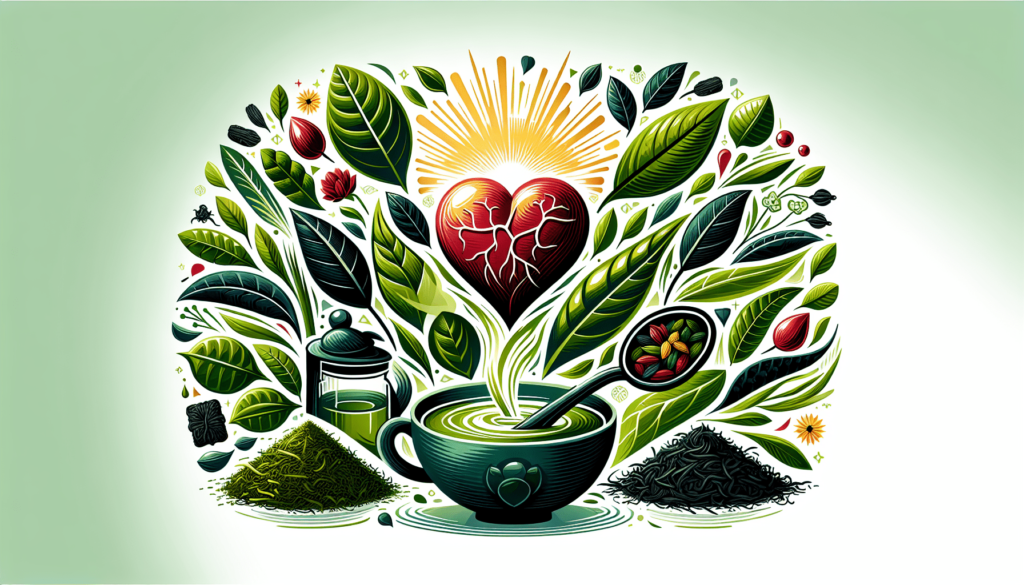Are you a tea enthusiast curious about the various types of tea and their incredible health benefits? Look no further! In this article, we will explore the wonderful world of tea, specifically green, black, and herbal teas. From boosting metabolism and promoting weight loss to improving heart health and reducing stress, each type of tea comes with its own unique set of health benefits. So sit back, relax, and prepare to discover the amazing advantages of indulging in your favorite cup of tea.

Health Benefits of Green Tea
Green tea is not only a refreshing beverage but also offers numerous health benefits. One of its key advantages is its high antioxidant content. Antioxidants are compounds that help protect our bodies from free radicals – unstable molecules that can cause damage to our cells. Green tea is packed with antioxidants, including one called epigallocatechin gallate (EGCG), which is known for its powerful health-promoting properties. These antioxidants help to combat oxidative stress and reduce inflammation in the body, ultimately promoting overall health and well-being.
In addition to its antioxidant content, green tea has been found to boost brain function. It contains a small amount of caffeine, which can improve alertness and concentration. Moreover, it also contains an amino acid called L-theanine, which has been shown to have a calming and relaxing effect on the brain. The combination of caffeine and L-theanine in green tea can enhance cognitive function, improve mood, and support mental clarity.
If you’re looking to shed a few pounds, green tea may be the perfect addition to your weight loss journey. Green tea has been found to aid in weight loss by increasing thermogenesis – the process by which the body burns calories to produce heat. The catechins found in green tea help to boost metabolism and fat oxidation, leading to an increase in calorie expenditure. Additionally, green tea can help to suppress appetite and reduce food cravings, making it easier to stick to a healthy diet.
Lastly, green tea is known for its potential to lower the risk of cardiovascular disease. Research suggests that regular consumption of green tea is associated with a reduction in LDL cholesterol levels (the “bad” cholesterol) and an increase in HDL cholesterol levels (the “good” cholesterol). This is important because high levels of LDL cholesterol can contribute to the development of heart disease. By promoting healthy cholesterol levels, green tea helps to protect against cardiovascular issues and maintain heart health.
Health Benefits of Black Tea
Black tea, like green tea, also offers a plethora of health benefits. One of its key advantages is its ability to improve heart health. The flavonoids found in black tea have been shown to have a positive impact on heart health by reducing the risk of coronary heart disease. Regular consumption of black tea has been associated with a decrease in blood pressure and LDL cholesterol levels, both of which are risk factors for heart disease.
In addition to its beneficial effects on heart health, black tea also boosts the immune system. Black tea contains compounds called tannins, which have antimicrobial properties and help fight against harmful bacteria and viruses. Moreover, black tea is rich in antioxidants that strengthen the immune system and protect against oxidative stress. By incorporating black tea into your daily routine, you can give your immune system a much-needed boost and help ward off illnesses.
Another advantage of black tea is its ability to promote digestive health. Black tea contains polyphenols, which have been shown to have a positive impact on gut health. These polyphenols help to promote the growth of beneficial bacteria in the gut, thus improving overall digestion and nutrient absorption. Additionally, black tea has been found to have anti-inflammatory properties, which can alleviate digestive issues such as bloating and inflammation in the digestive tract.
Furthermore, black tea contains compounds that exhibit anti-cancer properties. The theaflavins and thearubigins found in black tea have been shown to have potential anti-cancer effects. These compounds have been found to inhibit the growth of cancer cells and reduce the risk of certain types of cancer, including breast, ovarian, and lung cancer. While further research is needed, incorporating black tea into your daily routine can be a simple and enjoyable way to potentially reduce your risk of developing cancer.
Health Benefits of Herbal Tea
Herbal teas, also known as herbal infusions or tisanes, are made from various plants and herbs, each with its unique health benefits. One of the key advantages of herbal tea is its ability to relieve stress and anxiety. Many herbs used in herbal teas, such as chamomile and lavender, have calming properties that can help relax the mind and alleviate symptoms of stress and anxiety. By enjoying a cup of herbal tea, you can create a ritual of relaxation and promote a sense of calm in your everyday life.
In addition to stress relief, herbal tea is known for its digestive benefits. Certain herbs, such as peppermint and ginger, have been used for centuries to aid digestion and soothe the stomach. Peppermint tea, for example, can help relieve symptoms of indigestion, bloating, and stomach discomfort. Ginger tea, on the other hand, can alleviate nausea and promote healthy digestion. By incorporating herbal teas into your daily routine, you can support a healthy digestive system and enjoy improved overall wellness.
Moreover, herbal tea has been found to improve sleep quality. Many herbs used in herbal tea blends, including chamomile, valerian root, and passionflower, have sedative properties that can help promote relaxation and induce sleep. These herbs have been used for centuries as natural remedies for insomnia and sleep disturbances. By sipping on a warm cup of herbal tea before bed, you can create a soothing bedtime routine and improve the quality of your sleep.
Lastly, herbal teas are known for their immune-boosting properties. Various herbs used in herbal teas, such as echinacea and elderberry, have been traditionally used to support immune function and ward off common illnesses. These herbs contain vitamins, minerals, and antioxidants that help strengthen the immune system and protect against pathogens. By incorporating herbal teas into your daily routine, you can give your immune system a natural boost and support your body’s defense mechanisms.

Antioxidant Content
Each type of tea – green tea, black tea, and herbal tea – contains different antioxidants that contribute to their health benefits.
Green tea, as mentioned earlier, is rich in epigallocatechin gallate (EGCG), a powerful antioxidant that helps to combat oxidative stress and reduce inflammation in the body. EGCG has been studied for its potential to protect against chronic diseases like cancer and heart disease.
Black tea contains different antioxidants called theaflavins and thearubigins. These antioxidants have been found to have anti-inflammatory and anti-cancer properties. They also contribute to the rich flavor and dark color of black tea.
Herbal teas, on the other hand, can vary in their antioxidant content depending on the herbs used. Common herbs used in herbal teas, such as chamomile and lemon balm, contain various antioxidants that contribute to their health benefits. While the specific antioxidants may vary, herbal teas are generally a good source of beneficial compounds that promote overall health.
Caffeine Content
If you’re mindful of your caffeine intake, it’s essential to know the caffeine content of different tea types.
Green tea contains a moderate amount of caffeine. On average, an 8-ounce cup of green tea contains around 20-30 milligrams of caffeine. This amount is significantly less than what you would find in a cup of coffee but still provides a gentle energy boost without the jitters associated with higher caffeine intake.
Black tea, on the other hand, has a higher caffeine content compared to green tea. An 8-ounce cup of black tea typically contains around 30-60 milligrams of caffeine. While still lower than coffee, black tea can provide a stronger stimulant effect and is a popular choice for those seeking a pick-me-up.
Herbal teas, such as chamomile and peppermint, are naturally caffeine-free. This makes them an excellent choice for individuals who are sensitive to caffeine or prefer to avoid it altogether. Herbal teas can be enjoyed throughout the day and even before bedtime without disrupting sleep.
Weight Loss and Metabolism
If you’re looking to boost your metabolism and support your weight loss goals, understanding how different teas can aid in these areas is crucial.
Green tea has been studied extensively for its potential weight loss benefits. One of the ways it promotes weight loss is through thermogenesis – the process by which the body burns calories to produce heat. The catechins found in green tea help to increase the body’s metabolic rate and fat oxidation, leading to a higher calorie expenditure. By incorporating green tea into your healthy diet and exercise routine, you may experience improved weight loss results.
Black tea has also been found to enhance metabolic rate. Consuming black tea can help increase the number of calories burned at rest, which can contribute to weight management. Additionally, black tea contains compounds that can help regulate blood sugar levels, which is important for maintaining a healthy weight.
Herbal teas, such as dandelion and nettle tea, can aid in weight loss by promoting detoxification. These teas have diuretic properties that help to eliminate excess fluids from the body, reducing water retention and bloating. This can result in temporary weight loss and a sense of feeling lighter. It’s important to note that while herbal teas can support weight loss efforts, they should be complemented with a balanced diet and exercise for long-term results.
Heart Health
Maintaining a healthy heart is crucial for overall well-being, and different teas can contribute to cardiovascular health in various ways.
Green tea has been shown to help lower LDL cholesterol levels, also known as the “bad” cholesterol. High levels of LDL cholesterol can contribute to the development of heart disease. The catechins in green tea inhibit cholesterol absorption in the intestine and promote its excretion, leading to a reduction in LDL cholesterol levels. Consuming green tea regularly can play a role in maintaining healthy cholesterol levels and supporting heart health.
Black tea has been found to have a positive impact on reducing blood pressure. High blood pressure is a risk factor for cardiovascular disease, and by incorporating black tea into your lifestyle, you may be able to lower your blood pressure levels. Black tea contains compounds that promote the dilation of blood vessels, leading to improved blood flow and lower blood pressure.
Herbal teas, such as hibiscus and hawthorn tea, can also support heart health. Hibiscus tea has been shown to help lower both systolic and diastolic blood pressure in individuals with hypertension. Hawthorn tea, on the other hand, has been used traditionally to support blood vessel health and improve circulation. By incorporating these herbal teas into your daily routine, you can support a healthy heart and reduce the risk of cardiovascular issues.
Digestive Health
Proper digestion is essential for overall health and well-being. Different teas can have beneficial effects on digestion and alleviate digestive issues.
Green tea, as part of a balanced diet, can promote gut health. The catechins found in green tea have been shown to have prebiotic effects, which means they promote the growth of beneficial bacteria in the gut. A healthy gut microbiome is crucial for optimal digestion and nutrient absorption. By incorporating green tea into your routine, you can support a healthy gut and improve overall digestive function.
Black tea is known for its anti-inflammatory properties, which can be beneficial for reducing inflammation in the digestive tract. Inflammation can contribute to digestive issues such as bloating, discomfort, and inflammatory bowel diseases. By consuming black tea, you can potentially alleviate inflammation and support a healthy digestive system.
Herbal teas, such as chamomile and ginger tea, have long been used to relieve indigestion and promote healthy digestion. Chamomile tea can help soothe the stomach and alleviate symptoms of indigestion, while ginger tea can reduce nausea and support efficient digestion. By incorporating these herbal teas into your routine, you can support digestive health and enjoy a comfortable, well-functioning digestive system.
Stress and Anxiety Relief
In today’s fast-paced world, stress and anxiety have become prevalent issues for many individuals. Different teas can provide much-needed relief and promote a sense of calm.
Green tea, despite its caffeine content, contains an amino acid called L-theanine, which has been shown to have a relaxing effect on the brain. The combination of caffeine and L-theanine in green tea can promote alertness and concentration while simultaneously inducing a state of calmness. By incorporating green tea into your daily routine, you can enjoy the benefits of increased focus and reduced stress.
Black tea has been found to elevate mood and promote a positive state of mind. The polyphenols and theaflavins present in black tea may have mood-enhancing properties, making it a comforting and uplifting beverage. By sipping on a cup of black tea, you can potentially improve your mood and alleviate feelings of stress and anxiety.
Herbal teas, such as lavender and lemon balm tea, have long been used as natural remedies for stress and anxiety. These herbs have calming properties that can help relax the mind and promote a sense of tranquility. By incorporating herbal teas into your daily routine, you can create moments of relaxation and find relief from the stresses of daily life.
Sleep Quality and Relaxation
Getting a good night’s sleep is essential for overall well-being and productivity. Different teas can contribute to improved sleep quality and relaxation.
Green tea, despite containing some caffeine, contains theanine, an amino acid known for its relaxing properties. Theanine can help promote relaxation and reduce anxiety, making it a suitable beverage to enjoy before bedtime. By sipping on a cup of green tea in the evening, you can unwind and prepare your mind for a restful night’s sleep.
Black tea, particularly varieties like chamomile and valerian root tea, has long been used as a natural sleep aid. These herbs have sedative properties that can help induce sleep and improve sleep quality. By incorporating black tea blends containing these herbs into your bedtime routine, you can create a relaxing ritual that promotes restful sleep.
Herbal teas that are specifically formulated to support sleep, such as chamomile, lavender, and passionflower tea, can be highly effective in promoting relaxation and improving sleep quality. These herbs have been used for centuries as natural remedies for insomnia and sleep disturbances. By sipping on a warm cup of herbal tea before bed, you can create a peaceful environment and enjoy a rejuvenating night’s sleep.
In conclusion, green tea, black tea, and herbal tea each offer unique health benefits that can positively impact various aspects of your well-being. From their antioxidant content to their effects on weight loss, heart health, digestion, stress relief, and sleep quality, incorporating these teas into your daily routine can be a simple and enjoyable way to improve your overall health and promote a sense of holistic wellness. So why not start incorporating a cup of tea into your daily routine and experience the numerous health benefits that these remarkable beverages have to offer? Cheers to your health and happiness!

